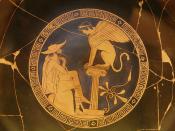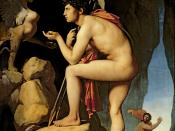A Universe of FateThe three Theban plays of Sophocles are set in a time ruled by gods and goddesses and above all a time ruled by fate. There is little any of the main characters can do to escape the preordained tragedy set upon them ÃÂ they are forced to function within a channel of events that cannot be reversed or avoided. ÃÂLook through all humanity: youÃÂll never find / a man on earth, if a god leads him on, / who can escape his fate;ÃÂ (pg 298 lines 266-69) these are the words of Antigone, the daughter of the ill-fated Oedipus. She is probably one of the best judges of this because she was not only born of the tragic and unrealized marriage of a son with his mother, but she grew up the caretaker of the blind Oedipus, leading him through his journeys as an outcast. She is a youth forced to see what ill fate creates and destroys, and she is also forced to grow up prematurely as a consequence.
Despite the terrible games fate and the gods play with Oedipus and his family, they are still faithful to the rites and rituals required for appeasing the gods, such as properly burying the dead. However, according to Oedipus: ÃÂThere is no escape, ever / not for a single godless man in all the world,ÃÂ (pg 299 lines 303-04). No matter what one may do to try and escape fate in this Greek world depicted by Sophocles, the gods will have their way.
Fate rules the life of Oedipus from the moment he is born. His mother, Jocasta, hearing prophecies that he is doomed to kill his father and sleep with her sends him away to be killed in the hopes that fate will not touch him; but...


